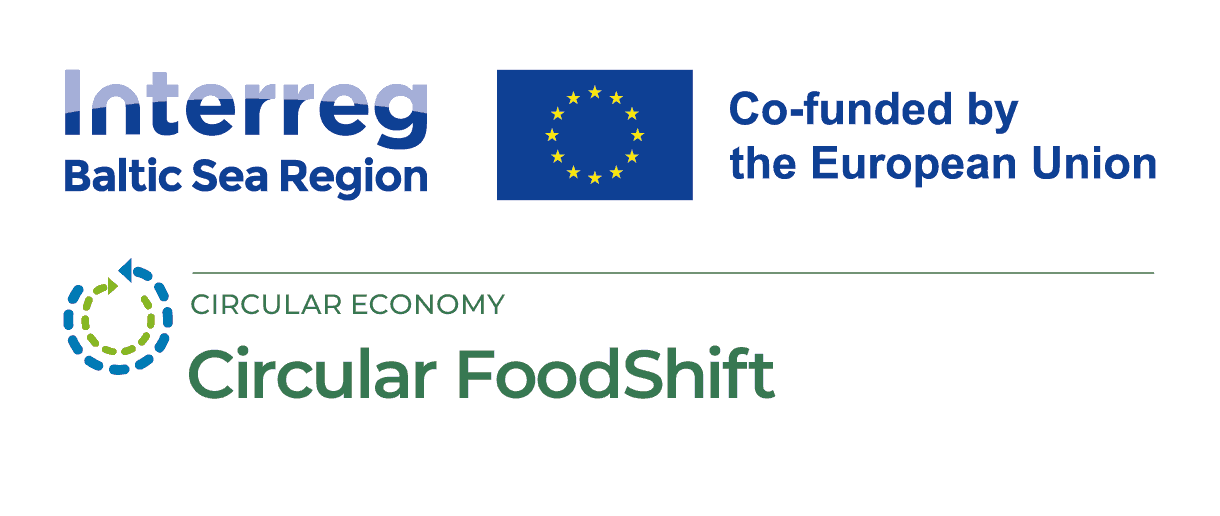
Circular FoodShift
Circular FoodShift
Context
Various regional municipalities across the Baltics have put food and sustainability as a priority in their long term regional strategic plans. However, the lack of experience, competencies, resources and limited capacity at the local and regional municipality level puts barriers and impedes contextualizing food in the field of circular economy, and tackling the food waste and food loss challenges.
Municipalities need collaboration, partnerships, knowledge and understanding about "circular economy for food" program models, implementation methods, tools, evaluation, and policy development.
Solution
A defined and unifying framework to support local and regional authorities working on the circular transition of their food systems. It will highlight strategies in cross-sector collaboration and capacity building models, to significantly reduce the amount of food waste and food loss in their cities and regions.
The project will provide them with concrete instruments and tools for recognising the circular economy for food and its potential for emission reductions, and see collaborative, upstream efforts as a cost-effective solution for tackling multiple challenges, including climate change, biodiversity loss, employment and poverty.
Challenge
The slow pace of cross-sector collaborations for Circular Food Systems development in Tartu-, Latgale- and Vilnius regions' rural and peri-urban areas. The three regions are all geographically located in the eastern part of the Baltics and have many challenges in common.
Food is strategic and could be a perfect field for testing a new approach towards raw material and waste and for the development of a new context of inquiry, defined as “Circular Economy for Food”. The aim of the project is to build partnership and to solve the challenge of getting local and regional authorities and stakeholders from different sectors to co-develop a joint and holistic vision for the long-term regional circular food system that is both sustainable and mutually beneficial.
Project activities
- Methodology for defining capacity building actions and cross-sector cooperation models, and assessing its productivity impact will be developed.
- Development of "Setting the table for a Circular FoodShift", a defined framework for municipalities. It will offer sector-specific guidance (entry points of the project) to support the municipalities in identifying practical circular economy interventions in collaboration with stakeholders from schools, businesses, interest groups, academia, civil society, and more.
- Training sessions to improve the quality of school food and reduce food waste in school canteens, training and empowering school cooks and urban food enablers on sustainable cooking to put theory into practice.
- Introduce circular business models to support SMEs in the HoReCa sector on food waste reduction.
- Innovative methods and opportunities for upcycling agri-food.
- Dissemination of the results to/within the local municipalities in Tartu-, Latgale- and Vilnius region.
Budgets
in numbers.
-
0.50MillionTotal
-
0.40MillionErdf
-
0.00MillionNorway
Top news
News
News
News
Our solutions
-
Output
Circular FoodShift
in numbers.
- 58.37688534999999526.716865143718564
- 54.723355925.3380012
- 56.690293823.7853409
- 56.939306124.0693444
- 62.795410422.8442015
Project partners
- TownTartu
- Region
- CountryEstonia
- RegionLõuna-Eesti
- RepresentativeAssociation of Municipalities of Tartu County
- Phone
- E-Mail
- Web
- TownVilnius
- Region
- CountryLithuania
- RegionVilniaus apskritis
- RepresentativeSustainable Gastro
- Phone
- E-Mail
- Web
- TownOzolnieki
- Region
- CountryLatvia
- RegionZemgale
- RepresentativeLatvian Rural Advisory and Training Centre
- Phone
- E-Mail
- Web
- TownRiga
- Region
- CountryLatvia
- RegionRīga
- RepresentativeGreen Liberty
- Phone
- E-Mail
- Web
- TownSeinäjoki
- Region
- CountryFinland
- RegionHelsinki-Uusimaa
- RepresentativeSeinäjoki University of Applied Sciences
- Phone
- E-Mail
- Web
Associated organisations
Contacts
-
Project manager, Communication managerJennifer AvciSustainable Gastro
-
Financial managerSven TobrelutsAssociation of Municipalities of Tartu County
Follow us
-
Social media
-
Additional links
News
Events
| 20 |
| June |
16:00 - 17:00 (EEST)
| 04 |
| June |
09:30 - 11:30 (CEST)
| 13 | - | 14 |
| May | ||
| 18 |
| March |
10:00 - 13:00 (EET)
| 12 |
| March |
10:00 - 13:00 (EET)
| 07 |
| March |
14:00 - 15:30 (EET)
| 07 |
| March |
09:00 - 16:00 (EET)
| 04 |
| March |
10:00 - 11:15 (EET)
| 23 |
| January |
15:00 - 16:30 (EET)
| 27 |
| November |
15:00 - 16:30 (EET)
| 22 |
| October |
12:00 - 16:00 (EEST)
| 17 |
| October |
10:00 - 16:00 (EEST)
| 09 |
| October |
10:00 - 13:00 (EEST)
| 01 |
| October |
10:30 - 12:30 (EEST)
| 06 |
| July |
19:00 - 20:00 (EEST)
| 04 |
| June |
15:30 - 17:00 (EEST)
| 14 | - | 15 |
| May | ||
09:00 - 16:30 (EEST)
| 14 |
| May |
16:30 - 19:30 (EEST)
| 08 |
| May |
15:00 - 16:30 (EEST)
| 25 |
| April |
15:30 - 16:30 (EEST)
| 20 |
| March |
15:00 - 16:30 (EET)




